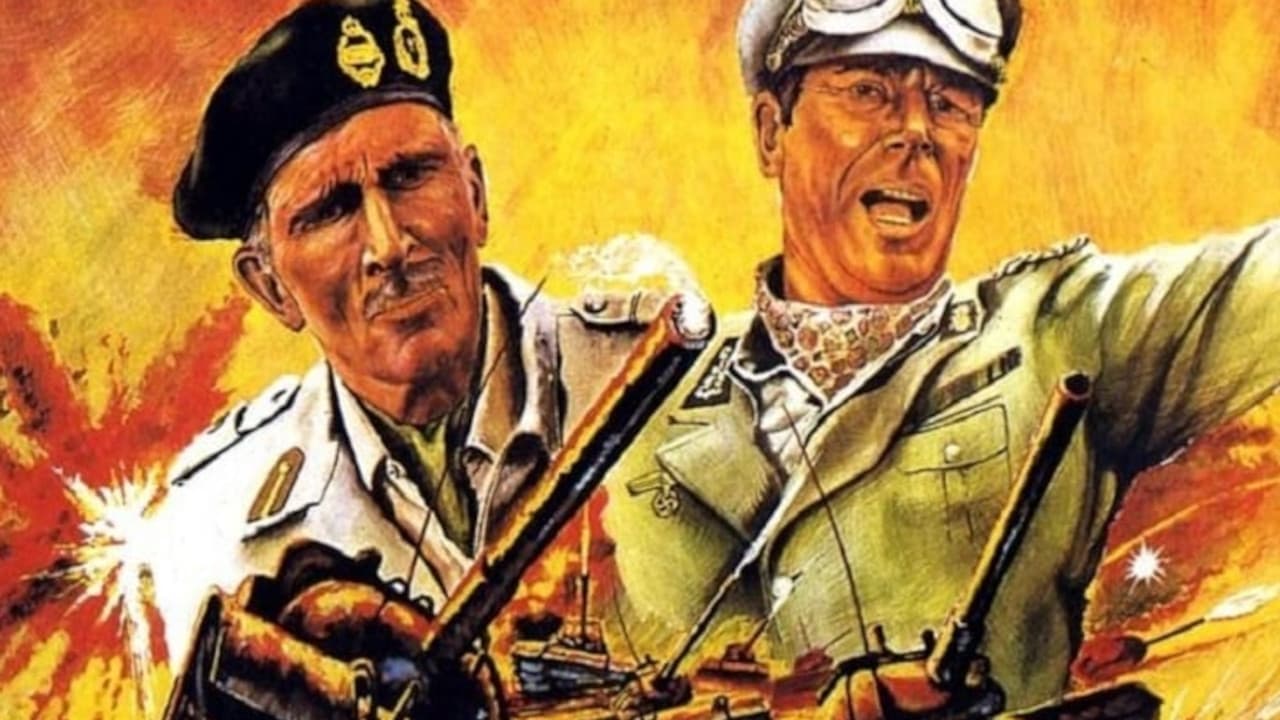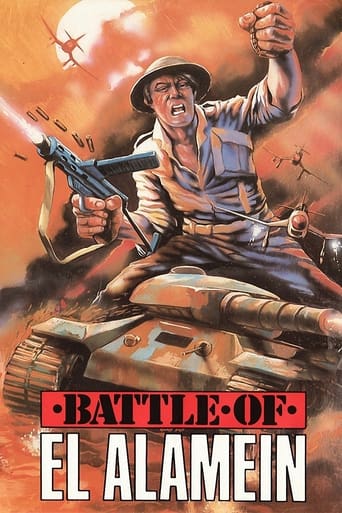



The greatest movie ever made..!
Don't listen to the negative reviews
Am I Missing Something?
A Brilliant Conflict
'El Alamein' is a WW 2 movie, sensationalist and exploitative, unassuming and episodic; British, Germans and Italians fight unsparingly in the African desert, and we recognize the dunes, the hills of gray sand, from the westerns of the '60s, the envy and intrigues cause the temporary removal of Rommel, meanwhile the Germans loose most of their tanks due to the British's perfidy but also abnegation and determination, Rommel is sent back, only to assure the retreat, against the leader's order . We will also think about the difference between a movie as a popular show, and a movie as a work.We look at war from the headquarters, and from an Italian stronghold. The main ideas are toughness and courage, both amply provided by all the military involved; 'El Alamein' also shows strategies, the British duping the Germans with a phony map of the minefield, the Germans using the Italians to back their retreat. Characteristically, the movie isn't good-natured, but amoral, indifferent to ethics, which makes the plot plausible; the credits boast the support, and possible the approval of the Italian army. The protagonist is lieutenant Giorgio, from one of Folgere division's companies; goodish cast (Hilton, M. Rennie, Ira Furstenberg, Hossein, Salerno). The known commanders, Rommel, Montgomery, Canaris, have supporting roles or cameos. Rommel's military genius is undermined by intrigue and the leader's insanity.The battle scenes seem a bit shapeless (except those of the heroic resistance of the company against the British tanks, while the Germans retreat), as the real aim of the movie are some generic effects: like hell-raising, etc.. This is the main idea of a popular show: not as a work, but as providing a set of generic emotions. It doesn't need a director, but a hack.I enjoyed 'El Alamein'. Loosely structured, accomplished for what it was meant to be, cynical, rhetorical, episodic, sometimes with the sense of hopelessness and despair known from the Italian genre movies, and also the familiar sloppiness, it doesn't relish in filming landscapes, or people. In an American war movie, there's the effect on the audience, and also the scene as thought in itself, as depiction, as insight, as shaped; the Italian genre movies seem to undercut this idea of a scene, right to the effects themselves. So they care less about shape, about work, and more about the popular show. Even very humble American genre movies have this objective structure, this dramatic shape, which the Italian movies don't care for. 'El Alamein' has a plot, but not a dramatic storyline; the Italians didn't rip off a structure, but some topics. Further, the American genre movies also resort to an essentially English lyricism, which is wholly alien to the Italians. The Italian rhetoric may be sentimentalist, but dry, without lyrical depth.(This is a typology; these are ideal types. The European genre movies aren't the only to belong to the 'Judy and Punch' type; not all of them belong to it. Once acknowledged this _ideality of the types, the national criterion will lead one to a further understanding: e. g., the Italian genre movies lack a dramatic structure, but have charm, appeal, zest.)
View MoreOK I know, it's a cheesy flick with a low budget, but I really enjoyed it. The Italian tanks coming into the battle was awesome! I always play this game called Panzer General and my favorite moves are trying to amass Italian troops against the Allies just to test my ability. I'm glad the Italians were run by very VERY incompetent Officers because they could have been a real asset (more so) to the Germans. This is the story of an elite Italian Infantry unit (the Bersaglieri). In all, six of the 12 total Bersaglieri regiments fought in North Africa, compiling an excellent combat record. More than once, Bersaglieri units fought to the last man to hold a position while German units ran away. This movie tells of one of those engagements, and the first time I saw it and what armament they had to face a dozen tanks, I was really entertained and so will you! Try to get a decent print though because I was so desperate to see this one time that I bought it on tape and it was horrible, the DVD was really bad but at least it was watchable. It's the only one of it's kind that I've seen although I loved movies like Stalingrad (the BW version) that showed some of the Romanian army's in action. Interesting for war film buffs and recommended.
View MoreItaly, along with much of the rest of the world, was into producing lots of cheapo war movies (mostly WW2) during the late-60's. The trend died out with the disillusionment caused by the Vietnam war, as did the popularity of these "gung-ho" war films.Battle of El Alamein isn't such a film. It's probably the most objective and anti-war film made since ALL QUIET ON THE WESTERN FRONT. While the battle sequences are big and exciting, there's nothing glamorous about fighting this kind of war. The soldiers are all shown as equally miserable, barely eeking out an existence in a network of trenches on the sunbaked deserts of North Africa. While it primarily focuses on the heroics of an Italian division (the real-life Italian army was best known as one of the most poorly-led and low-morale armies at the time), the film doesn't get too preachy and while it villifies no one, only showing how some generals (especially the fictional Schwartz) inevitably swung the battle in their enemy's favor due to their impatience and misguided ideals.THE BATTLE OF EL ALAMEIN also does a great job of blending fictional characters with nonfictional ones (like Rommel, Montgomery, Von Thoma, and Stumme) in a nonfictional setting. While the battle itself is abridged and perhaps over-simplified to focus on the Italian division, that's perhaps best for the sake of narrative, character development, and making the emotional impact as strong as possible.Stylistically, the film is done fairly well in late-60's style, with plenty of zoom-lens technique, close-ups, etc. It does drag in spots but only due to the predictability because we KNOW that the axis is gonna lose, but it does a good job keeping the suspense high by showing the Italians taking heavy losses in every engagement. We never know which characters are gonna make it through and which ones aren't.Despite it's flaws, I doubt a better, larger, or more compelling depiction of the battle of El Alamein shall ever be made.
View More"The Battle of El Alamein" is to the Italian film industry what "The Longest Day" was to Hollywood a historically accurate portrayal of a real military action. This Italian-French co-production was filmed with the full cooperation of the Italian Army, and features a star-studded international cast.Director Giorgio Ferroni spends some time focusing on the officers running the battle to outline the big picture and lend historical credence to his focus, a fictional story of a front-line Italian infantry company which becomes entangled in the campaign. When his Captain (Ettore Manni, "Heroes in Hell") is killed, Lt. Giorgio Borri (Frederick Stafford, "Eagles over London") is forced to take over command of his company. Borri is an inexperienced young officer with a lust for adventure, even if it means putting his men in harm's way. Stafford is never less than totally convincing, the contempt his men feel for him can be shared by the audience. He's a true jerk who learns the hard way what war is all about. Enrico Maria Salerno is his brother, a veteran Sergeant-Major, who shows up unexpectedly and question's the Lieutenant's decisions every step of the way. Rounding out the platoon are several familiar Italian actors, including Sal Borgese, Ricardo Pizzuti, Massimo Righi and Nello Pazzafini.To add credibility to his story, Ferroni also spends a great deal of time focusing on the situations within both the British and German High Commands. Michael Rennie ("The Devil's Brigade") plays Field Marshal Montgomery with gusto and arrogance, just as well and as memorably as Michael Bates would in "Patton" less than two years later. Also on the British side is the humanitarian Lt. Graham Lt. Graham (George Hilton, "The Liberators"), who protests the massacre of innocent German prisoners in one moving, dramatic scene and winds up volunteering for a suicide mission. He also has a face-to-face encounter with Lt. Borri, which breaks down the barrier between opposing sides in wartime. The men on the front lines are just grunts, there to do their job the officers, even those on your own side, don't care about you and your welfare; you're just another rifleman. Finally, Ferroni focuses on the German situation and these may be the finest scenes in the film. Most of the scenes take place in an underground command bunker, a set which has never been so well-captured and looked more realistic. Field Marshal Rommel is played brilliantly by Robert Hossein ("Desert Assault"), who makes Rommel a true skeptic of Hitler with his stern and loud opinions. Rommel was a true soldier, fighting to get the job done, and Hossein's performance is on-target. The supporting German characters are all excellent, too: Gerard Herter ("Battle of the Commandos") is especially good as a dedicated Nazi General; Tom Felleghy ("Kill Rommel!") plays Gen. von Thoma, a skeptic of just about everything, loyal only to Rommel; and Giuseppe Addobbati ("Hell's Brigade") is an incompetent General, who makes a poor tactical error, resulting the destruction of half of the Afrika Korps. The action sequences are all the more believable and gripping because of the characters embroiled in them. The film's opening is a sequence depicting the ambush of an Italian artillery company, in which Ferroni makes the most of his camera. This sequence is filled with pans, zooms and quick cutting. Machine-gun fire kicks up puffs of dirt everywhere and several soldiers die. The later battle scenes are shot with the same dedication to detail, and for the third act Ferroni brings in dozens of tanks and lots of big explosions. There is one really bad-looking night scene involving some miniature tanks, but that can be virtually ignored because everything else outweighs it. Despite the epic proportions of the action, the well-established characters give them a deeply personal significance. From the start of the film, Ferroni establishes a mood and feel of intensity and hopelessness. None of the characters are clean-shaven; they are all sweltering in the intense desert sun. One scene in which Lt. Borri must trek through the desert alone without water was especially well-acted. This film takes the story of the heroic grunts in the field and makes us feel for them feel their thirst, feel their joy when supplies arrive, feel their longing for home when one soldier fondles a picture of his newborn son at home. Carlo Rustichelli's mournful score only adds to the proceedings.Tie a great cast, epic battle sequences and fine editing and flavor and one has a strong, entertaining war film. This ranks with the classics. Not be missed!
View More